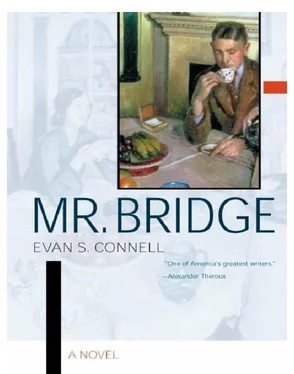“No?” he asked with a challenging expression. “No?” he repeated. “How come? He’s mine, isn’t he? I killed him, so he belongs to me. I can do anything I want with him.”
“Eat it,” Carolyn said. “The fur and the claws and the tail and the ears and everything else. I hope you choke. I hope you die.”
“Nobody wants to listen to you,” he muttered. “Get lost.”
“Take his gun away and don’t give him any allowance.”
Mrs. Bridge put one arm around Carolyn’s shoulders. “Now, now, just calm down. Your father will do whatever is best.”
Mr. Bridge said, “Suppose you and I strike a bargain, son. I will allow you to skin the squirrel, and you do as you please with the skin. Tack it to a board and hang it in your room, if you wish. However, there is one condition.”
Douglas looked up at him suspiciously.
Mr. Bridge folded his arms and went on: “You must leave it there until I say you may get rid of it.”
“Is that all?”
“That is the condition.”
“What’s the catch?”
“There is no catch.”
Douglas thought this over. He poked some holes in a snowdrift with the muzzle of his gun. At last he said, “What happens if it starts to stink up my room?”
“You heard me. You will keep it until you have my permission to throw it away.”
Douglas’ eyes suddenly filled with tears. He gave the elm tree a savage kick, and he said just loud enough to be heard, “I guess I can bury it somewhere.”
Now another year was ending. The year had been good and he regretted the end of it, but he felt pleased that it was concluding without sickness in the family and with indications that the worst of the Depression might be over. The children were growing up nearly as he hoped they would and his wife was content. These were the important things. Secondly, he could feel the burden of his work, and this also was good.
Roosevelt, of course, was a poor choice, a man who already had damaged the structure of the economy, very possibly the worst president since Ulysses Grant. And if the voters responsible for him had not yet acknowledged their mistake they would be forced to soon enough. The unions were out of hand, Communists had gotten desks in the Labor Department, and there was the threat of increased taxes. These things were the result of Roosevelt’s New Deal, and the implications were serious. Mr. Bridge considered the future of the country and often discussed it. He found other men as angered and frustrated as he was himself, all of them helpless to alter this current of socialism. However, if one could imagine that Roosevelt and his left-wing advisers did not exist, or believe they would be thrown out of office at the next election, or at least come to their senses and modify their programs — well, then, life could not be much better.
The clouds that hung over Europe were not blowing away, yet nobody would forget the lesson of the World War. Nobody would be quick to start another war. And if that did happen it was not likely to involve America. Too many people remembered.
Meanwhile there was much to be thankful for. Money was not plentiful, and there was suffering; but for the majority of men who were industrious enough to work, who did not stand around on street corners complaining and waiting for the government to feed them, there was enough.
At midnight on New Year’s Eve at the country club a champagne glass shattered in the fireplace and the orchestra played “Auld Lang Syne.” Mr. Bridge lifted his glass in response to the toasts and remarked, as he brushed a sprinkle of confetti out of his hair, “Happy Days!”
Not long after New Year’s a letter arrived from an attorney in Tennessee stating that Mrs. Bridge and her children had been named to share in the estate of Lulu-belle Watts, recently deceased. Mrs. Bridge was very much distressed. “Poor thing,” she said again and again. “I had no idea Lulu had passed away.”
“Was she the goofy one?” Douglas asked.
“That’s the woman. That is the woman,” his father said.
“Well, she was sweet,” Mrs. Bridge said. “Oh, dear, 1 should have been nicer. The poor thing. I do feel guilty.”
“You were as nice to her as anyone could be. You have nothing to reproach yourself for. That woman was a borderline case. In my opinion she would have been better off in a mental institution.”
“How much do I get?” Carolyn asked.
“Now, Corky, I don’t know how much you ‘get,’ or how much any of the rest of us will ‘get.’ It doesn’t matter. We have enough to eat and we should be thankful. There are more important things in the world than money. Poor Lulu. I feel terrible. Whenever she wrote she asked about everybody. She thought so much of all of us, and she remembered everybody’s birthday. She never had a family of her own. I really should have invited her to visit us more often.”
“Once was enough,” said Mr. Bridge.
“I’m afraid it was a bit hectic,” Mrs. Bridge admitted. “But of course her health wasn’t good. It just seems to me that I didn’t do as much as I should have.”
“Under the circumstances, you did as much for her as anyone could reasonably be expected to do.”
“I suppose you’re right. I just feel so sorry for her.”
“Well, it’s too bad, but it happens to us all sooner or later.”
“Cut the gloom, will you?” Douglas said.
Mrs. Bridge sighed and shook her head. Reluctantly she picked up the letter. “How do I go about answering this?”
“Give it to me,” he said, and took it from her and put it in his pocket. “I’ll have Julia type up a response in the morning and bring it home for you to sign.”
Not long after that the word came back from Tennessee: Mrs. Bridge was to receive $2,222.22 while each of the children would receive $333.33.
“That woman,” said Mr. Bridge when they got this news. “If I told you once I told you a dozen times — that woman would have been better off in an institution.”
“I believe she was interested in astrology,” said Mrs. Bridge.
“I know what I want,” said Douglas. “A racing bike. Can I?”
“ May I,” his mother said.
“It’s your money,” his father said. “If that’s what you want. What about you two?” he asked the girls.
Ruth said she was going to buy clothes.
“And you,” he asked Carolyn, “as long as the others can’t think past tomorrow, what are you going to do with your windfall? Squander it?”
Carolyn said, “I want an oil well.”
“Who doesn’t?”
She was not amused. “You told Mother you almost made a million dollars once.”
“I said that? I don’t think so. I think you must be mistaken. I’m sure I never told your mother such a thing.”
“You did so,” Carolyn said.
“Oh my, I’m starting to remember,” said Mrs. Bridge. “Years ago. Corky, you can’t remember anything that far back. Surely you can’t.”
“Yes, I do,” said Carolyn.
“Well, I don’t,” said Mr. Bridge. “You’ll have to enlighten me.”
“It had something or other to do with your friend Henry Gutekunst. When he first moved to Oklahoma.”
“Henry Gutekunst,” he exclaimed, looking incredulously at Carolyn. “You couldn’t have been more than five years old when Henry Gutekunst moved to Oklahoma.”
“Younger than that,” Mrs. Bridge said, patting Carolyn on the back.
“I remember,” Carolyn insisted. “You told Mother you’d be a millionaire if you had any sense.”
Now it had begun to sound familiar. He listened while Carolyn repeated what he had said. He was astonished. She seemed to be reading or reciting rather than remembering. She scarcely hesitated. He recognized certain words he often used, and the rhythm of his speech, and it brought back a moment he had nearly forgotten. He had read aloud an article from the financial page of the Star . Henry Gutekunst had found oil in a field a few miles south of Tulsa. It was the first of many wells he brought in. Gutekunst was now a multimillionaire. Six months before the first strike he had suggested going into partnership.
Читать дальше












